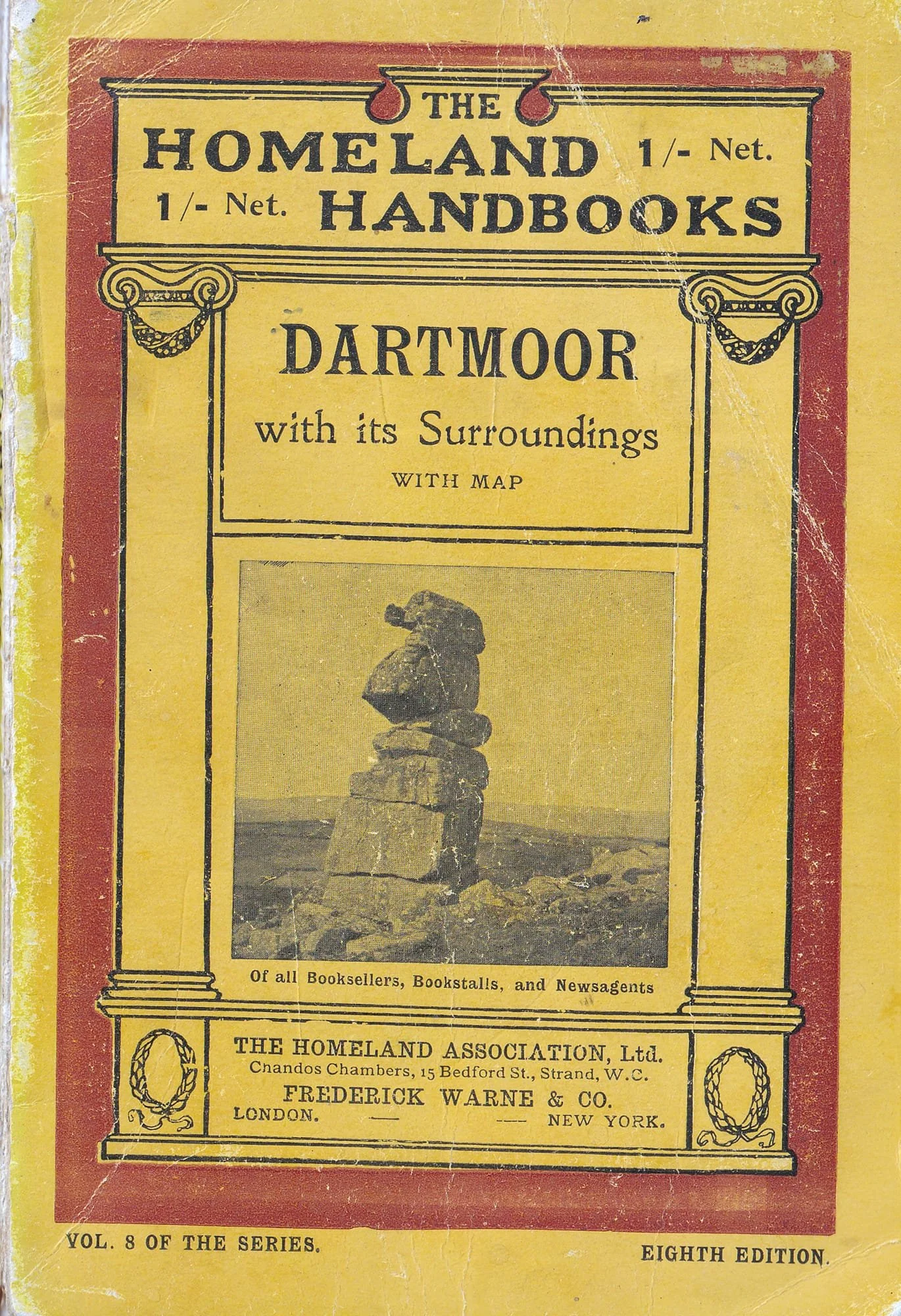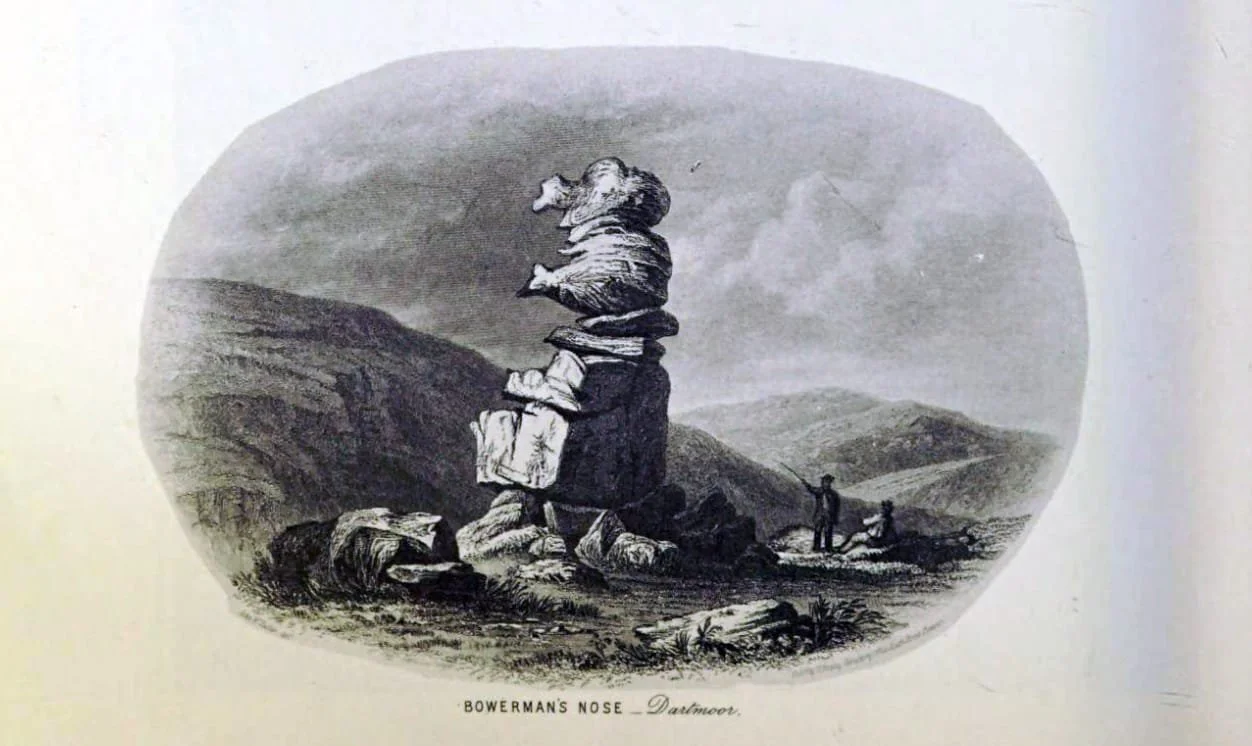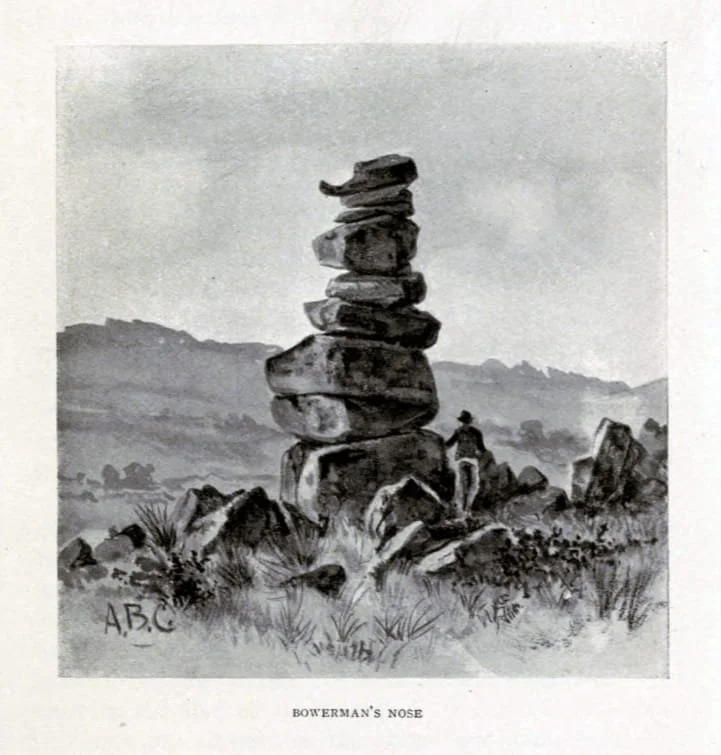Bowerman’s Nose or “Legends are like memes in slow motion”
THE WHOLE OF THIS ARTICLE IS IN FLUX - COME BACK LATER TO SEE HOW IT’S CHANGED 😁
This entry was originally posted on my Facebook page and then I discovered some more information and decided to use it as the basis for my “Hill Talk” which is a part of the assessment to gain the Hill & Moorland Leader Qualification.
I’ve not got around to editing this yet - so what is below, isn’t the final blog entry - come back when it’s complete … you’ll know when that is because this text won’t be here 🤣
Bowerman's Nose - shot on a crappy Pentax 110 lens adapted for my Sony a7r ... I quite like the effect ... do you know the legend behind the name?
As with most myths and legends there seems to be little logic or even the pretense of coherence between the various lines of thought ... one idea revolves around the belief the stack of rocks was some kind of Rock Idol (and we're not talking Jimi Hendrix here) ... commentators even suggesting that Druids carved the stones to this shape 😁
This idea seems to be prevalent in the early nineteenth century - drawing a lot of weight from Plymouth born poet Nicholas Toms Carrington in his "Dartmoor" poem ... circa 1834
“On the very edge
Of the vast moorland, startling every eye,
A shape enormous rises ! High it towers
Above the hill’s bold brow, and, seen from far.
Assumes the human form ; - a Granite God !
- To whom, in days long flown, the suppliant knee
In trembling homage bow’d. The hamlets near
Have legends rude connected with the spot,
(Wild swept by every wind,) on which he stands
- The Giant of the Moor.”
Carrington himself, writing in the notes to his poem says;
“This is an enormous mass of stone or pile of rocks upon Heighen Down in Manaton, rising to a height of more than 30 feet. At a distance it wears the appearance of a rude gigantic figure, but, on a nearer approach, it is found to consist of ledges of granite, irregularly piled on each other. It is generally considered as a rock idol, and bears the name of Bowerman’s Nose, of which name there was a person in the Conqueror’s time, who lived at Huntor or Houndtor in Manaton. In the road from Two Bridges to Tavistock Dr. Berger and his friend Mr. Necker were both struck at once with the resemblance of a granite rock to the Egyptian Sphinx in a mutilated state.””
He goes on to expound the idea that those who think druids didn't have anything to do with Dartmoor are obviously deluded.
In 1900 the famous Rev Sabine Baring Gould in his "A Book of Dartmoor" says unequivocally that:
“There are, indeed, to be seen curious piles of rock, but none of these are artificial, and there is not a particle of evidence that any of them received idolatrous worship.”
Being a Christian it's not surprising he's keen to distance himself from the idea of druids (just pointing out, not judging).
Now, many of you (who are perhaps aware of the witch/hare/hunter/hounds scenario) will be wondering where the hell that perfectly formed story is in my ramblings ... and that's where it gets interesting (well, at least to me).
I've always (I believed) been aware of this story ... proud hunter, witches, yadda yadda ... guess what? Seems to have zero basis in anything ...
My own copy of "The Homeland Handbooks - Dartmoor" ... 1913
In fact, whilst re-reading my own copy of "The Witchcraft and Folklore of Dartmoor" by renowned local journalist and author from Sticklepath; Ruth E. St. Leger-Gordon; I was surprised to notice this observation from a Dartmoor resident famed for collecting stories about witches and local folklore;
“Bowerman is the hard core of a small tor, now lying in a clitter of fallen rock around his feet. Weathering of the granite cracked his protecting shell and he eventually emerged in his present form like a chicken from an egg. With grey cap pushed well back from a face consisting mainly of the parrot-like feature which gives him his name, if ever a figure invited legend it is Bowerman. Yet, apart from one mythical murmer, no story emanates from this oddest of “men”. Any old fantasies that surely must once have existed, are now concealed for ever in Bowerman’s granite bosom. All that can be said about him with certainty is that Druids were in no way responsible for what has been fashioned entirely by nature, and that in the name we once more meet the Celtic maen. Bowerman is — or rather was — vawr-maen, the “great stone”. Somebody added the “nose” for obvious reasons; not we hope because he bore any resemblance to a completely mythical Norman bow-man who, according to a misty scrap of folklore, settled on a nearby moorland farm after the Conquest.”
I got excited by the mention of “ apart from one mythical murmer “ ... yet this is obviously a reference to the "nose" bit.
Written in 1972, this can only mean that the "Legend" must have been "discovered" sometime between 1973 and when it appears in any sort of written form.
My own copy of "The Folklore of Devon" published in 1977 by Ralph Whitlock does not mention Bowerman's Nose at all. Seems like a terrible omission.
I've carried out numerous searches and catalogued many well quoted sources from before this date that also make no mention of witches ...
"The face of Dartmoor : a wilderness in colour" published in 1985 is the first mention of witches and turning to stone that I can find (not saying there aren't more) and even then the mention is of the Hounds of Bowerman being turned to stone and forming Hound Tor ... nothing of Bowerman himself.
"𝐴 𝑓𝑜𝑙𝑘 𝑡𝑎𝑙𝑒 𝑠𝑎𝑦𝑠 𝑡ℎ𝑎𝑡 𝑡ℎ𝑒𝑦 𝑎𝑟𝑒 𝑡ℎ𝑒 ℎ𝑜𝑢𝑛𝑑𝑠 𝑏𝑒𝑙𝑜𝑛𝑔𝑖𝑛𝑔 𝑡𝑜 𝐵𝑜𝑤𝑒𝑟𝑚𝑎𝑛 𝑡ℎ𝑒 𝑚𝑖𝑔ℎ𝑡𝑦 ℎ𝑢𝑛𝑡𝑒𝑟, 𝑤ℎ𝑜 𝑤𝑒𝑟𝑒 𝑎𝑙𝑙 𝑡𝑢𝑟𝑛𝑒𝑑 𝑡𝑜 𝑠𝑡𝑜𝑛𝑒 𝑏𝑦 𝑎 𝑤𝑖𝑐𝑘𝑒𝑑 𝑤𝑖𝑡𝑐ℎ."
So, logic lets us know that sometime between 1977 and 1985 the now ever encompassing story that you'll find on nearly every internet search result for "Bowerman's Nose" was concocted.
It was around the eighties, and we'd just had the Star Wars phenomenon, so I deduce that unemployment, pubs and a renewed interest in Joseph Campbells work might be at the heart of this mystery 🤣
From "Devon 100 years ago" by Frank Graham - Publication date 1969 - From a drawing by John Tucker 1860
Let's not get ahead of ourselves whilst we read this meandering dismantling of greatly loved and oft repeated stories ... I don't actually care very much.
Legends are, frankly, made up stories and as such will have (no doubt) always been embellished ... added to and at some point older stories (most likely from another part of the world) been adapted and altered for a local audience ...
Stories are actually few and far between ... if you'd like to Google Kurt Vonnegut - The Shapes of Stories you'll see what I mean. 🤣 ... I digress)
My quest to discover the true "author" of the Legend (I have been on eBay and AbeBooks to add to my arsenal) ... if you have a definitive source, please let me know.
From "A Book of Dartmoor" by Rev Sabine Baring-Gould - Publication date 1900
- From a drawing by A. B. Collier, Esq.
Look at those illustrations of Bowerman's Nose, I'm no artist, but I'm fairly sure I could scribble something today which in 100 years would still be recognisable as the stack of stones we know (and the surrounding scenery).
I suggest that at least one of those artists might never have actually been to Hayne Down, and if they had, they obviously lied about their qualifications 🤣
There is no point to this, I like to read about Dartmoor, I like to research stuff ('cus it's fun to me), and I like to speculate, nothing more. I take photographs which the internet ignores, so now I might write a bit more and that will get ignored ... I don't care 🤣
What really interests me is how easily we can be swayed by an idea that fits with our world view.
How reading something, seeing something, repeating something, without checking it, means we could forever live in ignorance.
Which suits some.


